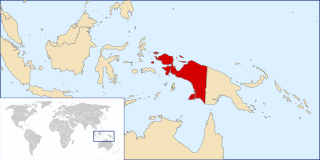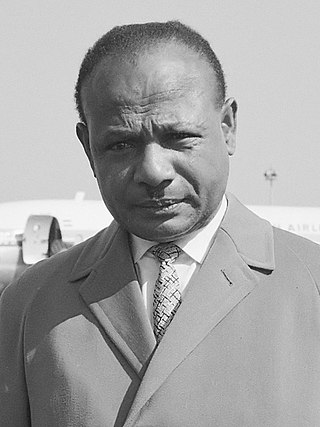Related Research Articles

Melanesia is a subregion of Oceania in the southwestern Pacific Ocean. It extends from New Guinea in the west to the Fiji Islands in the east, and includes the Arafura Sea.

The Free Papua Movement or Free Papua Organization is a name given to a separatist movement that aims to separate West Papua from Indonesia and establish an independent state in the region. The territory is currently divided into six Indonesian provinces of Central Papua, Highland Papua, Papua, South Papua, Southwest Papua, and West Papua, also formerly known as Papua, Irian Jaya and West Irian.
ELSHAM is a human rights non-governmental organization based in Jayapura, Papua, Indonesia. ELSHAM is the leading Papuan human rights organization. It was established in 1996 by the Roman Catholic Church, the Jayapura diocese of the Evangelical Christian Church in West Papua (GKI), and the Gospel Tabernacle Church of Indonesia (GKII).

Melanesians are the predominant and indigenous inhabitants of Melanesia, in an area stretching from New Guinea to the Fiji Islands. Most speak one of the many languages of the Austronesian language family or one of the many unrelated families of Papuan languages. There are several creoles of the region, such as Tok Pisin, Hiri Motu, Solomon Islands Pijin, Bislama, and Papuan Malay.

The Republic of West Papua, alternatively known as the Federal Republic of West Papua is a quasi-state consisting of the Western New Guinea region, which is currently part of Indonesia on the continent of Oceania. The region has been part of Indonesia since 1 May 1963 under several names in the following order, West Irian, Irian Jaya, and Papua. Today the region comprises six Indonesian provinces: Papua, Central Papua, Highland Papua, South Papua, West Papua, and Southwest Papua.

The Act of Free Choice was a controversial plebiscite held between 14 July and 2 August 1969 in which 1,025 people selected by the Indonesian military in Western New Guinea voted unanimously in favor of Indonesian control.

Western New Guinea, also known as Papua, Indonesian New Guinea, and Indonesian Papua, is the western half of the island of New Guinea, formerly Dutch and granted to Indonesia in 1962. Given the island is alternatively named Papua, the region is also called West Papua. It is one of the seven geographical units of Indonesia in ISO 3166-2:ID.

Religion in Papua New Guinea is dominated by various branches of Christianity, with traditional animism and ancestor worship often occurring less openly as another layer underneath or more openly side by side with Christianity. The Catholic Church has a plurality of the population. The courts, government, and general society uphold a constitutional right to freedom of speech, thought, and beliefs. A secular state, there is no state religion in the country, although the government openly partners with several Christian groups to provide services, and churches participate in local government bodies.

The United Liberation Movement for West Papua (ULMWP) is an organization formed from the merger of three political independence movements seeking independence for Western New Guinea from Indonesia. The ULMWP was formed on 7 December 2014 in Vanuatu uniting the Federal Republic of West Papua (NRFPB), the West Papua National Coalition for Liberation (WPNCL) and the National Parliament of West Papua (NPWP).

The Melanesian Spearhead Group (MSG) is an intergovernmental organization, composed of the four Melanesian states of Fiji, Papua New Guinea, Solomon Islands and Vanuatu, and the Kanak and Socialist National Liberation Front of New Caledonia. In June 2015, Indonesia was recognized as an associate member.

Sir Michael Thomas Somare was a Papua New Guinean politician. Widely called the "father of the nation", he was the first Prime Minister after independence. At the time of his death, Somare was also the longest-serving prime minister, having been in office for 17 years over three separate terms: from 1975 to 1980; from 1982 to 1985; and from 2002 to 2011. His political career spanned from 1968 until his retirement in 2017. Besides serving as PM, he was minister of foreign affairs, leader of the opposition and governor of East Sepik Province.
Benny Giay is a theologian, a social anthropologist, and an activist, known for his activities in reconciliation to protect the rights of the Papuans of the Western, Indonesian controlled, part of New Guinea.

The Papua conflict is an ongoing conflict in Western New Guinea (Papua) between Indonesia and the Free Papua Movement. Subsequent to the withdrawal of the Dutch administration from the Netherlands New Guinea in 1962 and implementation of Indonesian administration in 1963, the Free Papua Movement has conducted a low-intensity guerrilla war against Indonesia by targeting its military and police, along with ordinary Indonesian civilians.

Indonesia–Papua New Guinea relations are foreign relations between Indonesia and Papua New Guinea, two bordering countries north of Australia.

Nicolaas Jouwe was a Papuan leader who was selected to be vice president of the New Guinea Council that governed the Dutch colony of Netherlands New Guinea. As the president of the New Guinea Council was the Dutch civil servant Frits Sollewijn Gelpke, Jouwe was the highest ranking Papuan politician in the colony.

Filep Jacob Semuel Karma was a West Papua independence activist. On 1 December 2004, he helped raise the Morning Star flag at a ceremony in Jayapura, for which he was charged with treason and given a fifteen-year prison sentence. Amnesty International and Human Rights Watch protested on his behalf, the former designating him a prisoner of conscience. He was released on 19 November 2015.
Thomas Wapai Newei Sarampayai Wainggai was a West Papuan scholar, political and cultural leader, philosopher, and nationalist; as well as an advocate of West Papuan self-determination and Melanesian identity. He became one of the first West Papuan to get an advanced education outside of West Papua region. In 1988, he was arrested for his political beliefs and teachings and was sentenced to two decades behind bars. In 1996, he died as a political prisoner in a Jakarta prison.
Herman Wainggai is a West Papuan leader living in exile in the United States of America and banned for life from his hometown, Jayapura, the capital city of Papua in Indonesia. He is a former political prisoner who took on the Indonesian government and almost cost him his life. Mr. Wainggai escaped to Australia, where he lived briefly before traveling to the United States where he resides today. He is known to many in Australia and the world as the man who escaped on a canoe to Australia in 2006.
In early 1976, the Indonesian Army launched an offensive against Free Papua Movement (OPM) military elements in the southern parts of Jayapura Regency, in what is today Papua. While the operation failed to completely destroy OPM's presence, the organization was considerably weakened militarily from its losses.
Seth Jafeth Rumkorem was a West Papuan military officer and independence activist. He chose to defect from the Indonesian Army to the Free Papua Movement (OPM) after witnessing electoral fraud and human rights abuses conducted by the former. He quickly became the leader of the movement's armed wing and was among the signatories of the proclamation of the Republic of West Papua. He went into exile to Greece, after an attempt to secure weapons for OPM went wrong. He eventually relocated to the Netherlands, where he continued his activism until his death in 2010.
References
- ↑ "A freedom fighter exposed". 8 April 2007.
- ↑ Jacob Rumbiak: The story of a West Papuan independence campaigner, New Internationalist, March, 2000, by Andrew Kilvert
- ↑ Canberra's treaty 'killing off' Papuan democracy, Andra Jackson, The Age, November 9, 2006
- ↑ "New Internationalist interview". Archived from the original on 2008-05-14. Retrieved 2009-06-09.
- ↑ ARIA Award previous winners. "ARIA Awards – Winners by Award – Best World Music Album". Australian Recording Industry Association (ARIA). Retrieved 12 November 2020.